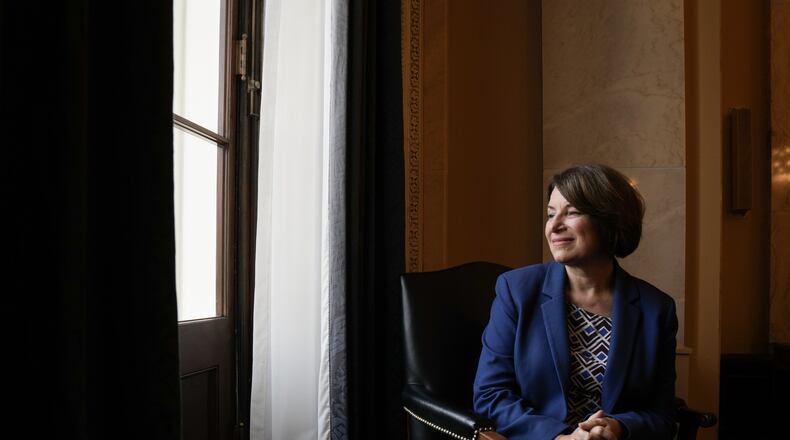About the Author
Minnesota U.S. Sen. Amy Klobuchar says she was diagnosed with breast cancer in March, and after successful surgery and a round of radiation treatment, she’s speaking out to encourage others not to delay routine examinations.
“There are so many people that are delaying routine exams during the pandemic. I did the same,” Klobuchar said in an interview. “Luckily for me, I did go in and I caught it early enough where I didn’t need chemotherapy and more extensive treatments.”
At a delayed mammogram in February, doctors at Mayo Clinic found small white spots called calcifications on her right breast. A follow up biopsy at the Piper Breast Center in Minneapolis confirmed that she had first-stage invasive breast cancer.
“It’s scary for anyone when you hear that,” she said. “And this is just an initial test, you don’t know if it’s going to be worse.”
Klobuchar, 61, was sitting in her apartment in Washington, D.C., waiting to cast a vote on the pandemic federal stimulus package when she got the news. At the time, the Democrat in her third term was sponsoring major election reform legislation and chairing the joint Senate investigation into the Jan. 6 insurrection. Few knew that the health of her father, Jim Klobuchar, was also rapidly declining.
Subsequent tests showed the cancer hadn’t spread beyond her breast, so a lumpectomy was scheduled for the end of March to remove the cancer. That was followed by a round of radiation treatment, which Klobuchar started two days after her father died in May.
“That was the hardest part for me,” said Klobuchar. " My husband and my daughter were the rocks for me the whole time.”
By August, doctors told Klobuchar that her treatment had gone well and her chances of developing cancer again are no greater than the average person. Klobuchar said she’s feeling great and will continue to get regular mammograms to monitor the situation.
Dr. Sandhya Pruthi, a professor of medicine and consultant in the breast diagnostic clinic at Mayo, said she saw people delay mammograms and live with breast lumps for several months before a checkup. Others skipped mammograms entirely in 2020 and returned this year with lumps.
“We know that when breast cancer is detected early, and because it’s localized, the five-year survival rate is anywhere from 95-99%,” said Pruthi. “We want women to know that if there is an abnormality and a change on their breast exam, or there’s something new that they haven’t felt before and it’s different from the other breast, to seek examination and get it checked out.”
Invasive breast cancer is the most common form of cancer among women. More than 250,000 women are diagnosed in the United States each year, Pruthi said.
Klobuchar said she didn’t want to share the story publicly right after father’s death or during key pandemic votes, but she now hopes her experience will prompt others to go in for the routine examinations, checkups and physicals that they may have delayed because of the pandemic.
The whole experience has given her perspective, she said. She’s grateful for her family and friends who reached out during the challenging months after her father’s death and when she was in radiation treatment. And she’s thankful for her health care providers, including nurses who gave her a red, white and blue mask during radiation treatment.
“It gives you that moment to reflect on everyone you love and realize that every day is a gift,” she said. “Don’t put off your exams. It could save your life.”

